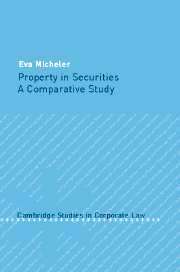Book contents
- Frontmatter
- Contents
- Preface
- Table of legislation
- Table of cases
- Introduction
- 1 Convergence and path-dependence
- Part I English law
- 2 Paper transfers
- 3 Dematerialisation
- 4 Impact on the institutional framework
- 5 Defective issues
- 6 Unauthorised transfers
- 7 Indirect holdings
- 8 Conclusions on English law
- Part II German and Austrian law
- Part III Conclusions
- Select bibliography
- Index
4 - Impact on the institutional framework
from Part I - English law
Published online by Cambridge University Press: 28 July 2009
- Frontmatter
- Contents
- Preface
- Table of legislation
- Table of cases
- Introduction
- 1 Convergence and path-dependence
- Part I English law
- 2 Paper transfers
- 3 Dematerialisation
- 4 Impact on the institutional framework
- 5 Defective issues
- 6 Unauthorised transfers
- 7 Indirect holdings
- 8 Conclusions on English law
- Part II German and Austrian law
- Part III Conclusions
- Select bibliography
- Index
Summary
One of the conclusions of chapters 2 and 3 was that the legal doctrine that prevailed when securities first emerged impacted on the process through which paper documents were eliminated from the transfer process. The influence attributable to the legal doctrine that governs investment securities will be further explored in this chapter.
The first observation to be made in this context is that English legal doctrine had an impact on the type of service provider that emerged in England to support transfers of securities. Because the law of novation became the legal doctrine according to which securities were transferred when they first emerged in England, the issuers became involved in the administration of securities transfers. Over time, service providers came into existence that assisted issuers to maintain registers. These service providers are referred to as registrars; their business is to maintain registers on behalf of issuers. The emergence of this particular type of financial services industry can be explained by the legal doctrine that governs securities transfers.
Moreover, because English registered securities do not constitute negotiable instruments, but are documents of evidence only, English market participants do not have the same need as German or Austrian market participants to keep certificates safe. If an English certificate is stolen or lost, the owner does not need to fear that a third party may acquire the securities in good faith.
- Type
- Chapter
- Information
- Property in SecuritiesA Comparative Study, pp. 87 - 89Publisher: Cambridge University PressPrint publication year: 2007



